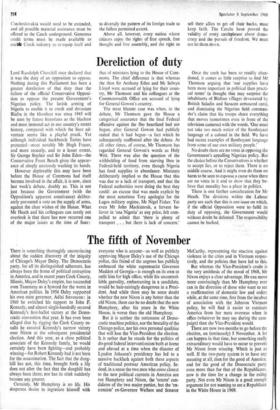Dereliction of duty
Lord Randolph Churchill once declared that it was the duty of an opposition to oppose. Nothing during this Parliament has been a greater dereliction of that duty than the failure of the official Conservative Oppoii- tion to oppose the present Government's Nigerian policy. The lavish arming of Nigeria to enable it to crush and devastate Biafra in the bloodiest war since 1945 will be seen by future historians as the blackest and most immoral act in our country's recent history, compared with which the Suez ad- venture seems like a playful prank. Yet although individual backbench Tories have protested—most notably Mr Hugh Fraser, and more recently, and to a lesser extent, Sir George Sinclair and Sir John Eden—the Conservative Front Bench gives the appear- ance of simply anxiously washing its hands.
However deplorable this may have been before the House of Commons had itself become involved in the affair, it is now, since last week's debate, doubly so. This is not just because the Government (with the Opposition's apparent connivance) deliber- ately prevented a vote on the supply of arms, against the cleat wishes of the House. What Mr Heath and his colleagues can surely not overlook is that there has now recurred one of the major issues at the time of Suez: that of ministers lying to the House of Com- mons. The chief difference is that whereas the then Sir Anthony Eden and Mr Selwyn Lloyd were accused of lying for their coun- try, Mr Thomson and his colleagues at the Commonwealth Office are accused of lying for General Gowon's country.
The most blatant case was when, in the debate, Mr Thomson gave the House a categorical assurance that the final Federal offensive against the Ibo heartland had not begun, after General Gowon had publicly stated that it had begun—a fact which he subsequently reaffirmed after the debate. At all other times, of course, Mr Thomson has regarded General Gowon's words as Holy Writ. There was also the question of the withholding of food from starving Ibos in Federal-held territory, even though Nigeria has food supplies in abundance. Ministers deliberately implied to the House that this was due to a lack of transport, and that the Federal authorities were doing the best they could : an excuse that was made explicit by the most notorious Tory apologist for the Lagos military regime, Mr Nigel Fisher. Yet even Mr John Mackintosh, a fervent be- liever in 'one Nigeria' at any price, felt com- pelled to admit that 'there is plenty of transport . . . but there is lack of concern.' Once the truth has been so readily aban- doned, it comes as little surprise to find Mr Thomson arguing that 'our supplies have been more important in political than practi- cal terms' (a thought that may surprise the inhabitants of Biafran villages devastated by British Saladin and Saracen armoured cars), and dismissing the Nigerian field comman- der's claim that his troops shoot everything that moves (sometimes even in front of the television cameras) with the words, 'One must not take too much notice of the flamboyant language of a colonel in the field. We have had recent examples of flamboyant language from some of our own military people.'
No doubt there are no votes in opposing the Government's appalling Nigerian policy. But the choice before the Conservatives is whether to accept lies, or to reject them. There is no middle course. And it might even do them no harm to be seen to espouse a cause when there are no votes in it and to show that they be- lieve that morality has a place in politics: There is one further consideration for Mr Heath. The divisions within the 'Labour party are such that this is one issue on which, if the official Opposition were to' fulfil its duty of opposing, the Government would without doubt be defeated: The responsibility cannot be burked. _






































 Previous page
Previous page